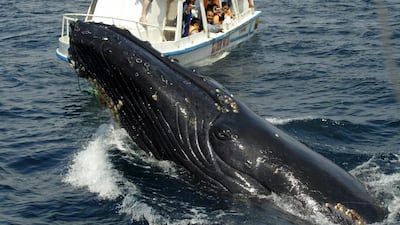PARIS // Newborn humpback whales and their mothers whisper to each other to escape potential predators, scientists reported on Wednesday, revealing the existence of a previously unknown survival technique.
“They don’t want any unwanted listeners,” said researcher Simone Videsen, the lead author of a study published in the journal Functional Ecology.
“Potential predators such as killer whales could listen to their conversations and use that as a cue to locate the calf and predate on it.”
Whales are known for their loud calls, used to gather together members of the pod. Male humpback whales also emit reverberating sounds to attract females during the mating season.
But this is the first time scientists have observed a unique, intimate form of communication between humpback mothers and calves.
Researchers from Denmark and Australia tracked each of eight calves and two mothers for 24 hours in Exmouth Gulf, Western Australia, a breeding ground for Antarctic humpback whales seeking warmer waters to mate and give birth.
Using tags attached to the animals, the team of scientists recorded their faint squeaks and grunts.
“These signals between mother and calf are more quiet than those of normal adult humpback whales,” Ms Videsen said. They are in fact 40 decibels lower than the singing of males in the area.
Although a male’s cry can resound over several kilometres, the pairs in the study could only hear each others’ calls within a distance of less than 100 metres, she added.
The low sounds were detected when the pairs were swimming, suggesting the discreet tone helps the mammals stay together in the murky breeding waters, infested with killer whales preying on stray calves.
The faint sounds are also a way to keep mate-seeking males from interfering in the humpback’s nurturing, a crucial time in the newborn’s life as it braces itself for an arduous 8,000-kilometre journey back home to the Antarctic, the researchers speculated.
The researchers also believe that mother and calf — in their effort to go undetected — may have developed a silent method to initiate suckling. Instead of signalling hunger vocally and risk getting spotted, the calves “rub against their mothers,” according to the study’s findings.
Humpback whales can be found both in the Arctic and Antarctic. Each pod spends the summer at the poles and travels to tropical areas in their respective hemispheres during the winter to breed.
The scientific investigation also shed light on the growing problem of ocean noise pollution that can severely disrupt marine life.
“Because mother and calf communicate in whispers, shipping noise could easily mask these quiet calls,” Videsen said, potentially provoking the pair to lose each other.
* Agence France-Presse

